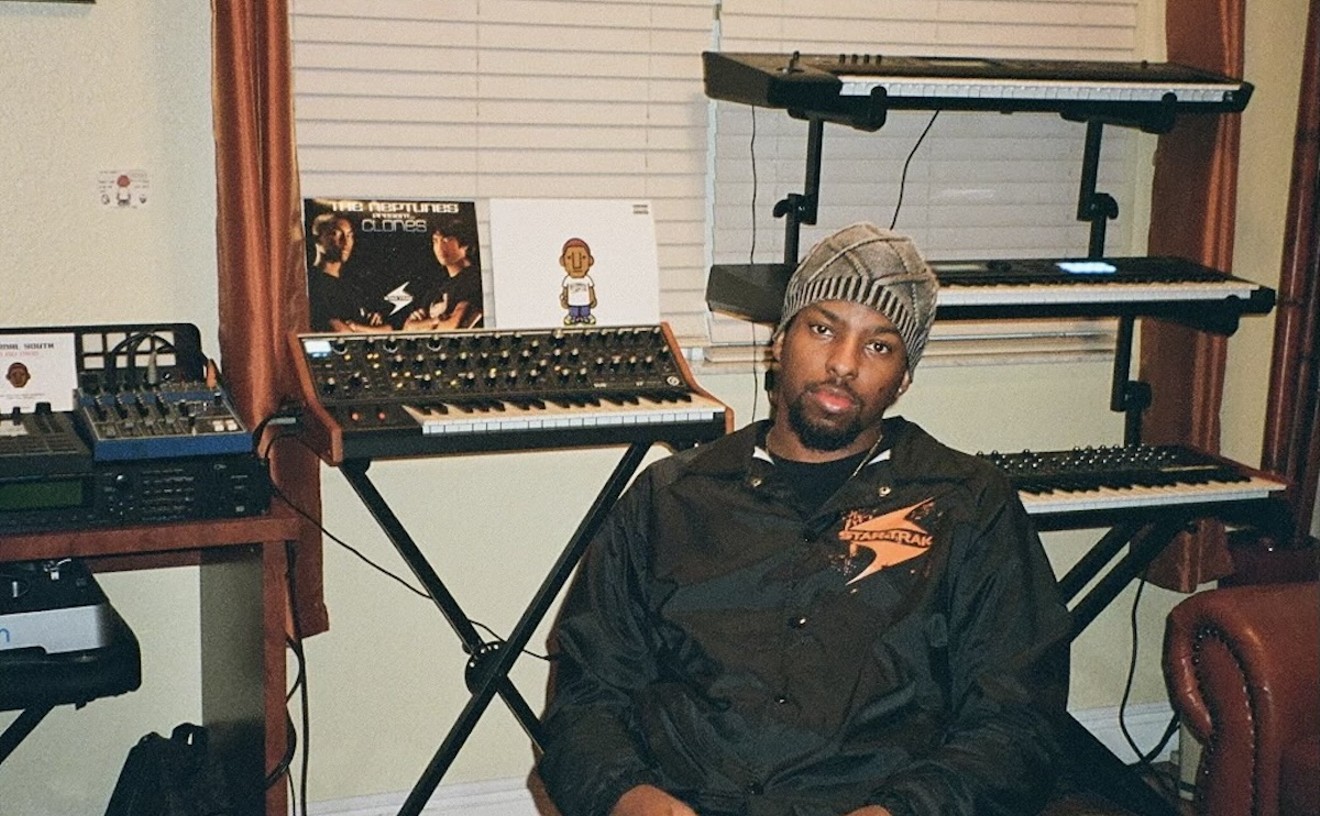Two years later, that guy's wish came true, if only temporarily, when the three surviving members of Led Zeppelin (guitarist Jimmy Page, singer Robert Plant, bassist John Paul Jones), accompanied by drummers Phil Collins (yes, him) and Chic's Tony Thompson, played together at Live Aid. In 1988 Page-Plant-Jones reconvened, this time with drummer Jason Bonham, the son of deceased Led Zep drummer John Bonham, as part of Atlantic Records' 40th anniversary bash. But except for those one-off shows, plus a less formal musical reunion at young Bonham's wedding reception, Led Zep stayed resolutely unreunited, with the trio persuing solo careers of varying success and creative intrepidness.
Until early 1994. That's when Page and Plant began collaborating on No Quarter, recorded on location in Wales (two songs) and Morocco (three songs), and in front of a TV studio audience in London (nine songs); MTV taped the sessions and broadcast them in October as a special called Unledded. Notably, Page and Plant excluded Jones from the entire project. Low-key in both concept and execution, No Quarter, released in November, consists of three new Page-Plant compositions, plus ten reconfigured and retooled Zep songs. Its sound reflects Page's long-standing -- and Plant's more recent -- fascination with world music, specifically Middle Eastern harmonics and drones, which the pair produce on No Quarter with the aid of the nine-member Egyptian Ensemble on strings and percussive exotica.
On February 26, in Pensacola, Page and Plant kicked off a yearlong international tour in support of No Quarter, winding their way south to the Miami Arena on Monday night, March 6. An album, an MTV special, a worldwide tour A that die-hard fan at the ARMS Concert must be dancing a misty mountain hop these days. Others, however, have retched in response to the resurrection of the ultimate monsters of rock. For example, this past fall, Bill Wyman (not him), music writer for the Reader, in Chicago, described Unledded this way: "The Zep songs chosen were uninteresting; the new ones forgettable; the various sites employed were uncomfortably Spinal Tap-ish; the interactions with the various exotic musicians were drearily forced."
Hmmm, maybe. And yet that assessment seems somewhat harsh, especially with the benefit of repeated listenings to No Quarter and a chance to witness Page and Plant in concert with their extensive entourage and accompanists: former Cure guitarist Porl Thompson, bassist Charlie Jones and drummer Michael Lee (both of whom have played previously with Plant), keyboardist Ed Shearmur, hurdy-gurdy player Nigel Eaton, eight members of the Egyptian Ensemble, the Miami Symphony Orchestra's string section (the tour uses local string sections at each of its stops). Plus, given the principals' lofty status in the, uh, rock pantheon, perhaps they deserve to be cut a little slack.
As Led Zeppelin's main songwriters and architects, Page and Plant chiseled out what has come to be regarded as the archetypal contemporary rock group over the course of ten albums, beginning with 1969's Led Zeppelin and ending with 1982's Coda, released after Bonham's death. First as overwrought interpreters of American blues, later as skillful rock composers, the four Brits who constituted Led Zeppelin combined equal parts bombast (think "Custard Pie") and elegance (think "All My Love"), establishing the standard for the hard-rock sound, the hard-rock on-stage performance, and the excessive hard-rock off-stage lifestyle (which consumed Bonham). Page's grinding start-stop riffs, Bonham's thunderous thud, Jones's sonic bass playing and textured keyboard work, Plant's piercing wail A all moved out like shock waves, influencing countless bands and creating a handful of imitators, from the earnest Heart (the female Led Zep) to the pathetic Kingdom Come (the cloned Led Zep).
Given that m.o., given Page's desperate career straits (in case it escaped your notice, please recall his dumb solo work and even dumber stint as guitarist for the hamfisted and dull band the Firm in the Eighties), and given Plant's recent career lull, why not reunite? Page had bugged Plant to participate in a collaboration for years, and while the latter repeatedly resisted, finally he agreed. But as Plant explains it in the press poop that accompanies No Quarter, their revived partnership "had to be new.... We had to actually expand it and develop.... What would be the point of us producing a middle-age sigh of relief from around the coffee table?"
A valid question, and one that Page and Plant cagily sidestep on No Quarter by bringing in the Egyptian Ensemble to rematrix and gently de-rockify a handful of Led Zeppelin songs A some well-known ("Kashmir," "Since I've Been Loving You"), some less immediately recognizable ("Four Sticks," "Nobody's Fault but Mine") A and lend Middle Eastern credibility to the pair's arid recent compositions. But in concert at the Arena, at least for the first half of the approximately two-hour show, Page and Plant, with Thompson, Jones, Lee, and Shearmur, sounded a great deal like Led Zeppelin, reeling off only slightly less ecstatic versions of "Thank You," "Hey Hey What Can I Do," and "Dancing Days" than Zep's recorded originals; ditto a Page-and-Plant-only acoustic interlude during which they performed "No Quarter" and the pallid new "Wonderful One."
In fact that "middle-age sigh" reverberated throughout the band's first ten songs, including an ill-advised cover of the Cure's "Lullaby" (presumably included in the mix as a sop to Thompson) and a gargantuanly overblown number (presumably from Page's 1988 solo album, Outrider). Wearing black leather pants and a blue, sleeveless shirt, the still-sexy 46-year-old Plant shook his leonine locks, mugged fetchingly for the crowd, and barked out his lyrics in a surprisingly strong, crisp voice, conveying considerably more vocal power and process than he does on No Quarter. Meanwhile, the 51-year-old Page (black nonleather pants, purple silk shirt) remained relatively sedentary, grinning frequently as he cranked out signature chords; he jolted to life only once, striding over to his bank of equipment to coax some histrionic feedback from his guitar A a silly-looking and -sounding spectacle. In sum, for that initial hour, Page and Plant and band waddled like Led Zeppelin, they quacked like Led Zeppelin, and very likely for the frequently hooting Miami throng, which ranged from saucer-eyed teens to gray-bearded fiftysomethings, they were Led Zeppelin.
But during the second half of the show they emerged as something wholly other, living up to Plant's above-mentioned admonition about "expanding and developing." Nigel Eaton kick-started their ascent with an at first mournful, then frenetically dervishlike solo on the hurdy-gurdy A a peculiar-looking (a wheel, a crank, strings) medieval instrument that produces a kinder, gentler bagpipeslike sound A that segued into a subtly effective "Nobody's Fault but Mine." Then the band romped through an agreeable "The Song Remains the Same," drowned out the Miami Symphony's strings on the bluesy "Since I've Been Loving You," and, juiced by the fervent playing of the Egyptian Ensemble, adroitly melded Eastern and Western musics on "Friends" and "Four Sticks." By the time they closed out their set with an effortlessly dazzling "In the Evening," the Arena surged with swaying bodies.
With the notable exception of an encore of "Black Dog," on which the crowd sang along to every "uh-uh-uh-uh," Page and Plant steadfastly eschewed their Led Zep hits: "Whole Lotta Love," "Immigrant Song," "Communication Breakdown," and, of course, "Stairway to Heaven." Not surprisingly they followed "Black Dog" A and finished the night A with "Kashmir," perhaps Led Zeppelin's most ambitious song, and certainly the one most associated with the band's Middle Eastern musical dabblings. Page and Plant successfully re-created the original version's majesty but wisely tempered its primal stomp, as the string section held a long, sustained note during the break and an Egyptian Ensemble member played a beautiful, evocative violin solo, accentuating the song's existing North African feel.
In the No Quarter press materials, Page theorizes, "It's more of a challenge to take things further, and that's exactly what we want to do A and have done." Well, yes and no. You could argue that both on record and in concert, the songs sort of remain the same for Page and Plant. But given the music's mostly engaging nature, where's the harm in that?










